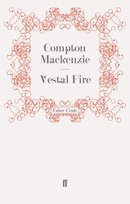On Compton Mackenzie :Allan Massie
Novelist, critic and journalist Allan Massie here pays tribute to the novels of Compton Mackenzie, whose books - Sinister Street, which was highly controversial on publication almost a century ago, and the two Capri novels Vestal Fire and Extraordinary Women) - are now available in Faber Finds.
Sinister Street
Sinister Street is the masterpiece of Compton Mackenzie’s first period, as an English, rather than Scottish, novelist. It offers not only a wonderfully vivid evocation of late Victorian and Edwardian England but a disturbing account of the hero Michael Fane’s personal development.
Mackenzie’s own disposition was sunny, but in this novel there is an awareness of the attraction of evil and the dark side of life which he would seldom recapture in his later work. It was this and the exploration of adolescent sexuality which cause the book to be banned by circulating libraries, the young Cyril Connolly to be beaten for having it in his possession at Eton, and Edmund Wilson, who shared his friend Scott Fitzgerald’s admiration for Mackenzie to declare that 'the "motif of utter foulness" is one of the most uncanny things in the book; you feel that you are not walking on solid ground, that it may give way at any moment and let you into the sewer'.
The germ of the novel may be found in Keats’s observation, quoted in the frontispiece: 'The imagination of a boy is healthy, and the mature imagination of a man is healthy; but there is a space of life between in which the soul is in a ferment'.
It is that ferment which Mackenzie portrays. Michael Fane himself 'could not remember any period of his life when the speculum of hidden thought had not reflected the manifestation of evil which overcast the manifestation of most ordinary existence'. The question is whether the boy and youth who had taken 'pleasure in the grotesque and macabre' can come through to a healthy maturity.
Yet it is a book of glowing light as well as dark shades. The Oxford section is entrancing - as fine as Evelyn Waugh’s portrait of Oxford in Brideshead Revisited. Max Beerbohm thought 'There is no book on Oxford like it. It gives you the actual Oxford experience. What Mackenzie has miraculously done is to make you feel what each term was like'.
Ford Madox Ford considered that the novel was 'possibly a work of real genius', and it persuaded Henry James that Mackenzie was 'very much the greatest talent of the new generation'. He praised its 'modernity'. and, though there are some lush passages that now seem somewhat dated, that judgement was acute. Sinister Street is more than a period piece. Almost a hundred years after its first publication, it retains the 'modernity' of all great novels. That is to say, its essence is not dated, but vividly alive.
The Capri novels: Vestal Fire and Extraordinary Women
The two Capri novels, Vestal Fire and Extraordinary Women, the outstanding works of Mackenzie’s middle period, drawn very closely from life - the originals of all the principal characters scarcely disguised - are less ambitious, but still delightful comedies, though comedies that show an awareness of pain and misery too. They owe something to their precursor, Norman Douglas’s South Wind and may be compared to Aldous Huxley’s early - and best - novels , Crome Yellow, Antic Hay and These Barren Leaves. To my mind they have lasted better than Huxley’s, for their exuberant vitality is irresistible.
- Related Authors:
- Compton Mackenzie
- Related Works:
- Sinister Street; Vestal Fire; Extraordinary Women


